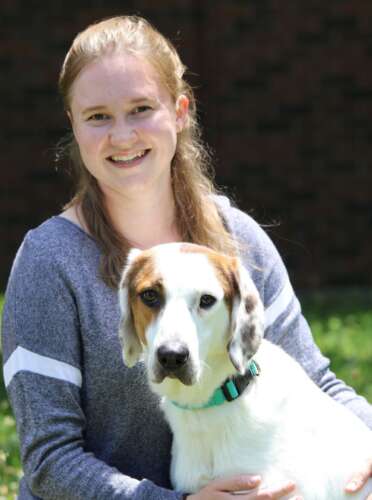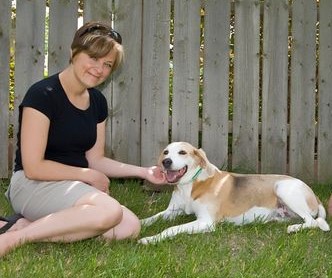Do you jog with your dog? Chances are if you do, you’re confident your pet is in pretty good shape, too.
New University of Guelph research finds that dog owners who exercise regularly tend to ensure their dog gets exercise, which in turn influences whether they believe their dog is at a healthy body weight.

Led by researchers in the Department of Animal Biosciences within the Ontario Agricultural College (OAC), the study is believed to be the first large-scale international survey to demonstrate a relationship between an owner’s exercise routine and their dog’s exercise routine as well as perceptions of the dog’s health.
Lead author and PhD candidate Sydney Banton said the paper, which appears in the journal PLOS ONE, is important given that 40 per cent of dogs are overweight and that previous research has shown that many owners are unaware of their dogs’ unhealthy weights.
“Before you can change people’s perception of their pets’ health, you have to understand what is driving their perception,” she said. “So that is why we wanted to look at how exercise habits of dog owners are linked to their perceptions of their dogs’ weight.”
Banton, along with animal biosciences professor and lead author Dr. Kate Shoveller as well as colleagues from OAC and the Ontario Veterinary College, analyzed results from a survey of almost 3,300 dog owners in France, Germany, the United Kingdom, Canada and the United States.
They asked owners about their diet and exercise routines as well as those of their dogs, including their perceptions of their dogs’ weight.
Those who reported spending four or more days per week vigorously exercising were 2.8 to 3.5 times more likely to believe their dog was at an ideal body weight compared to those who did not vigorously exercise. Those who reported their dog regularly performed vigorous exercise (playing ball, swimming, agility exercises) were 1.8 times more likely to believe their dog was at an ideal body weight.
Highlights need to incorporate exercise into weight loss regimens

Conversely, dogs that received less than 30 minutes of exercise per day had owners who were much more likely to report spending less time performing moderate exercise themselves.
“We were not surprised to see that those who have been told their dog is overweight were more likely to exercise their dogs for less time, but this highlights the need to incorporate exercise into weight loss regimens,” said Banton.
About 13 per cent of those surveyed thought their dog’s weight was not ideal or had had someone, including a veterinarian, tell them their dog was overweight.
These owners were also more likely to report restricting their dog’s food intake to control weight and more likely to report that their dogs received only 30-60 minutes of exercise a day.
“Together, the data suggests that these owners know their dogs are not at an ideal weight and are willing to change their dogs’ diet but not exercise them more,” said Shoveller, who is the Champion Petfoods Chair in Canine and Feline Nutrition, Physiology and Metabolism.
Easier to change pets’ diets than exercise routines
“This is unfortunate, but also somewhat understandable. It’s much easier to change what our pets eat rather than increase the amount or intensity of their exercise, because that would probably mean changing an owner’s exercise habits, too.”
The authors say while their findings highlight the need to incorporate exercise strategies into weight loss programs for dogs, few accepted guidelines exist to outline how much owners need to exercise their dog.
“There are a lot of guidelines for owners on how to feed their dogs, including on the label of most dog foods,” said Shoveller. “But there are limited resources backed by scientific evidence for how to exercise your dog.”
Part of the challenge of creating such guidelines is that the exercise needs of different breeds vary widely. The dog’s age also matters.
The results highlight the need for veterinarians to encourage owners to exercise their dogs to avoid weight gain, say the authors. They also underline the need for more resources for veterinarians to help guide exercise regimens.
This research was funded by Rolf C. Hagen, Inc., which had no role in the study.
Contact:
Dr. Kate Shoveller
ashovell@uoguelph.ca
Sydney Banton
bantons@uoguelph.ca
Dr. Adronie Verbrugghe
averbrug@uoguelph.ca
Dr. Mike von Massow
mvonmass@uoguelph.ca
